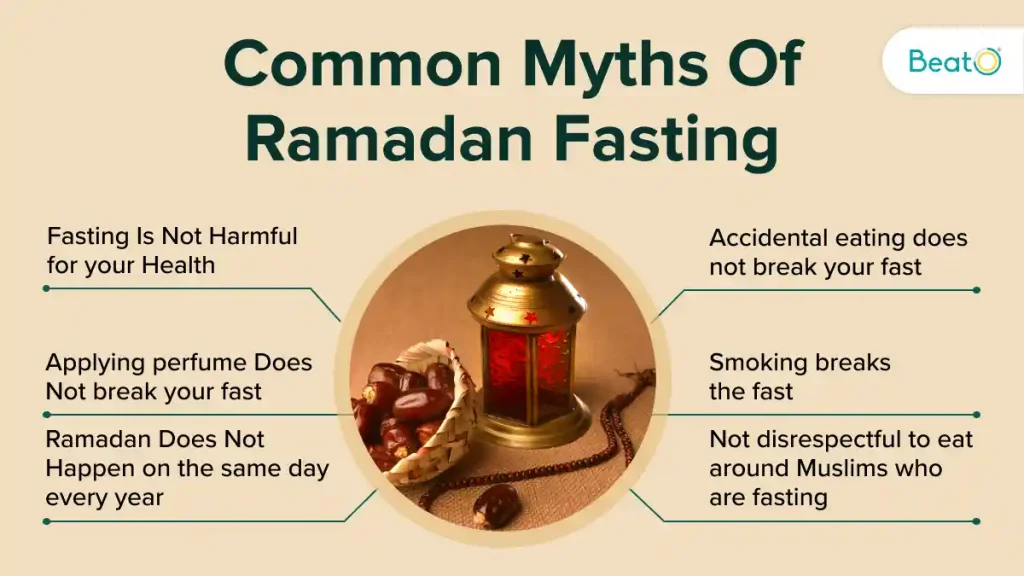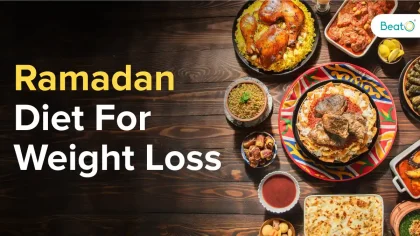As the month of Ramadan is approaching (or it’s there depending upon when you are reading this), people have heard myths and misconceptions about Ramadan fasting. It includes whether fasting is harmful to health if smoking voids a fast, or if the month of Ramadan is all about fasting. Let’s debunk these myths in this extract.

Common Myths And Misconceptions Of Ramadan Fasting

Ramadan is Only About Fasting
Ramadan is never just about refraining yourself from the halal food and drinks. It is a month of reprising your spirituality, restraining your mind from what’s ‘halal’ or ‘allowed’, and avoiding what’s ‘prohibited’ or ‘haram’.
It is a month when Muslims are promised rewards for the prayers they perform, and the Holy Quran that they read and reside in, and every good deed on the planet is rewarded manifold. On the contrary, refraining from what’s prohibited earns you rewards, and doing them lands you in a manifold of ‘sins’ or ‘gunah’ that will be accounted for on the day of judgment.
It is a month when Muslims are required to feed the needy, give ‘zakat’ or 2.5% of their wealth, and volunteer in activities that could benefit the human beings of their community and beyond. Ramadan is a month to prepare yourself for a year of forbearance, fear, and abstinence as well as spirituality to continue before it is renewed during the next year’s month of Ramadan and the cycle continues.
Also Read: Essential Post Running Stretches Every Runner Needs In Their Routine
Ramadan Fasting is Harmful for Your Health
Abstaining from any food or water or any other eatery can be harmful to your body, right? Research has proven that intermediate fasting is one of the best ways to burn fat. It helps remove toxins from the body as well as any dysfunctional or damaged component of the body. Fasting helps reach optimum energy metabolism, and enhance immune response, among other health benefits that cannot be denied.
Overall, fasting helps reduce body weight, body fat, anxiety levels, blood glucose levels, and body mass index, among others. However, if you are suffering from any chronic disease or disorder, it is better to consult a doctor and legit Islamic scholars beforehand as they might advise a certain change of routine, medication, or exercises to abide by fasting during the month unless it is too life-threatening which is when you can avoid fasting altogether.
Also Read: Ramadan Diet For Weight Loss: Unlocking The Secrets To Shedding Weight While Fasting
It is disrespectful to eat or drink around Muslims who are fasting during Ramadan
The answer is NO. Of course, if you take it from an etiquette point of view, you should refrain from eating in front of someone who is fasting and the same goes the other way around. However, Ramadan fasting is all about restraining yourself from what is halal, and in this context, it is about the urge to eat or drink when fasting. Thus, it isn’t disrespectful since more non-muslims in India aren’t observing fasting and have their right to eat whatever or wherever they like or want unless it is restricted by the law such as eating in a metro.
Applying perfume breaks your fast
No, it doesn’t break your fast. You can apply perfume or deodorant since it is for external use. Anything that goes in the mouth or into the body is prohibited when fasting.
You aren’t required to fast when travelling during Ramadan
The answer is, it depends. If you are travelling by air and will reach your destination in say 15-16 hours, you can still practice Ramadan fasting as long as you have dates and water to break when the time is due. You can still choose not to fast when travelling or to travel when fasting. It is because fasting is mandatory even if you are a labourer as there are no special corners cut for those who are physically fit and mentally sound to practice fasting unless it turns out to be life-threatening which is when you are permitted to break your fast.
Also Read:Best Yoga Mudras For Weight Loss You Must Try Now
All Muslims Fast
All Muslims indeed fast for 29 or 30 days in the month of Ramadan. However, there are a few technicalities. For instance, children below the age of seven aren’t required to fast. Elderly people are exempted from fasting if it is life-threatening in any way. People traveling to another state or country are exempted from fasting as well although, they are required to observe the remaining days of fasting after the month ends.
It includes individuals who aren’t able to fast due to health or a life-threatening condition such as thalassemia where someone might need blood transfusion coinciding with the month of Ramadan. Women who are on their periods aren’t allowed to fast for the said days.
Ramadan Happens on the same day every year
Unlike the Gregorian calendar which follows the movements of the sun, Muslims follow lunar movements and thus, that is reflected in the Islamic calendar as well. Every year, the month of Ramadan falls 10 days behind last year’s Ramadan. For instance, Ramadan 2023 started on 23rd March 2023, however, it will kickstart on March 11th or 12th in Ramadan 2024.
Smoking doesn’t break the fast
Anything that goes inside the mouth or the body be it solid or liquid or anything in-between may break your fast. Smoking is an obvious example as a smoker ingests the particles reaching the lungs thereby breaking the fast right away. Breaking a fast unknowingly is a sin and results in consequences that include keeping 60 days of fasting or feeding 60 people to account for a broken fast.
Also Read:The Ultimate Guide To Tricep Exercises
Accidentally eating or drinking breaks your fast
Every adult Muslim is required to fast during the month of Ramadan or Ramzan. However, there’s a common myth that eating accidentally when Ramadan fasting breaks it. Truth be told, it doesn’t break until it is done intentionally. If you willingly or intentionally try to eat or drink even a sip of water or other liquid, this will void the fast right there. Doing so will require 60 days of fasting or feeding 60 people to make up for a broken fast.
Wrapping Up
There are many do’s and don’ts during fasting in the month of Ramadan. However, these are the few myths and misconceptions that people have about fasting. We tried to debunk a few of them for your knowledge.
Also Read:Effective Natural Home Remedies For Stomach Pain
Disclaimer: The content of this article is compiled information from generic and public sources. It is in no way a substitute, suggestion, or advice for a qualified medical opinion. Always consult a specialist or your own doctor for more information. BeatoApp does not claim responsibility for this information.
Throw out your non-verified glucometer and try the BeatO clinically approved smartglucometerkit. Check your blood sugar level instantly. Try out the BeatO diabetes care programfor a more organized healthcare routine.
Looking for a seasoned diabetologist? ChooseDr. Navneet Agarwal, an expert with 25+ years of experience. His specialisation in diabetology and obesity management provides personalised care. Elevate your health with a doctor’s recommendedglucometer, buy now.




